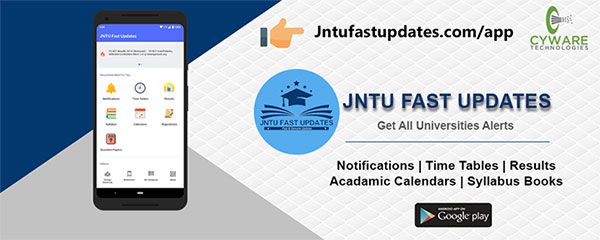JNTUK R16 3-2 Artificial Intelligence Material/Notes PDF Download
Students those who are studying JNTUK R16 CSE Branch, Can Download Unit wise R16 3-2 Artificial Intelligence (AI) Material/Notes PDFs below.

JNTUK R16 3-2 Artificial Intelligence Material/Notes PDF Download
OBJECTIVES:
- To have a basic proficiency in a traditional AI language including an ability to write simple to intermediate programs and an ability to understand code written in that language.
- To have an understanding of the basic issues of knowledge representation and blind and heuristic search, as well as an understanding of other topics such as minimax, resolution, etc. that play an important role in AI programs.
- To have a basic understanding of some of the more advanced topics of AI such as learning, natural language processing, agents and robotics, expert systems, and planning
UNIT-1
Introduction to artificial intelligence: Introduction ,history, intelligent systems, foundations of AI, applications, tic-tac-tie game playing, development of ai languages, current trends in AI
Download UNIT-1 Material PDF | Reference-2
UNIT-2
Problem solving: state-space search and control strategies :Introduction, general problem solving, characteristics of problem, exhaustive searches, heuristic search techniques, iterativedeepening a*, constraint satisfaction
Problem reduction and game playing: Introduction, problem reduction, game playing, alphabeta pruning, two-player perfect information games
Download UNIT-2 Material PDF | Reference-2
UNIT-3
Logic concepts: Introduction, propositional calculus, proportional logic, natural deduction system, axiomatic system, semantic tableau system in proportional logic, resolution refutation in proportional logic, predicate logic
Download UNIT-3 Material PDF | Reference-2
UNIT-4
Knowledge representation: Introduction, approaches to knowledge representation, knowledge representation using semantic network, extended semantic networks for KR, knowledge representation using frames advanced knowledge representation techniques: Introduction, conceptual dependency theory, script structure, cyc theory, case grammars, semantic web
Download UNIT-4 Material PDF | Reference-2
UNIT-5
Expert system and applications: Introduction phases in building expert systems, expert system versus traditional systems, rule-based expert systems blackboard systems truth maintenance systems, application of expert systems, list of shells and tools
Download UNIT-5 Material PDF | Reference-2
UNIT-6
Uncertainty measure: probability theory: Introduction, probability theory, Bayesian belief networks, certainty factor theory, dempster-shafer theory Fuzzy sets and fuzzy logic: Introduction, fuzzy sets, fuzzy set operations, types of membership functions, multi valued logic, fuzzy logic, linguistic variables and hedges, fuzzy propositions, inference rules for fuzzy propositions, fuzzy systems.
Download UNIT-6 Material PDF | Reference-2
TEXT BOOKS:
- Artificial Intelligence- Saroj Kaushik, CENGAGE Learning,
- Artificial intelligence, A modern Approach , 2nded, Stuart Russel, Peter Norvig, PEA
- Artificial Intelligence- Rich, Kevin Knight, Shiv Shankar B Nair, 3rded, TMH
- Introduction to Artificial Intelligence, Patterson, PHI
REFERENCE BOOKS:
- Atificial intelligence, structures and Strategies for Complex problem solving, -George F Lugar, 5thed, PEA
- Introduction to Artificial Intelligence, Ertel, Wolf Gang, Springer
- Artificial Intelligence, A new Synthesis, Nils J Nilsson, Elsevier
OUTCOMES:
- Identify problems that are amenable to solution by AI methods, and which AI methods may be suited to solving a given problem.
- Formalize a given problem in the language/framework of different AI methods (e.g., as a search problem, as a constraint satisfaction problem, as a planning problem, as a Markov decision process, etc).
- Implement basic AI algorithms (e.g., standard search algorithms or dynamic programming).
- Design and carry out an empirical evaluation of different algorithms on problem formalization, and state the conclusions that the evaluation supports.

320-x100(1).gif)
